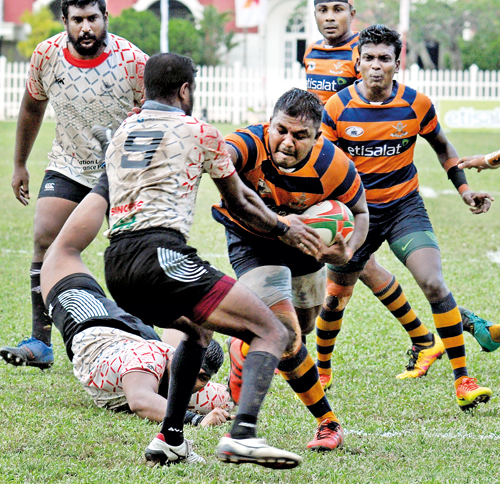The saga of monkey tricks and rugby rules
View(s):
Soldiers made the grand upset by defeating CH last week - File pic
This season’s rugby has seen a high in scoring tries, while confusion stalls as you hear a call hands on ground. This means that they are supporting their body weight by keeping their hands on the ground? My question is why they are doing this when you should be getting into a position to form a stable platform and provide good ball. How did problems arise? Is it a matter of coaching or is it from refereeing. At the end of the day if you want good rugby you need good ball and quick ball.
There were nine tries scored in the Havelocks-Police match as well as in the Air Force-Navy match. Eight tries in the Kandy-CR match while the tally in the CH-Army match was five. Havelocks beat Police by 31 points to 26 whilst crafty coach ‘Sanath Martis’ brought Havelocks back into the game within five minutes of the second half cutting the gap to a meagre five points. Police, who were unlucky not to beat Navy and Kandy found themselves on the losing side as Coach Martis used his experienced players to steal the match. Police played themselves out when they opted, late in the first half to stay inside the 22 while keeping the ball with the forwards rather than going for space. That is despite the the fact kicking to space helped them for 35 minutes. On the other hand I could not understand a Havelocks player attracting a yellow card. I say attracting, because the player infringed twice in three minutes and the referee opted to manage and leave 15 players on the field by talking and cautioning. Within the next two minutes he did it again and earned a yellow.
Another question I had was the number of infringements that set in after half time. Both teams seemed jaded, and Police seemed not to be mentally tough as they forfeited the unassailable lead they had.
Army took CH upfront with some robust play that upset CH, who possessed a number of skilled players with a rugby background. Most Army players cut their teeth in rugby after joining the force. Air Force stunned Navy for most parts of the game before going down. Kandy continued with their share of luck against CR who keep depending on penalty conversions to step-up their scores. CR has put through 16 penalties as against 10 by CH and around five each by the other six clubs.
Something I noticed was that when that when the tackle infringements are punished and the fringing is reduced there is more play. On the other hand these whistles are called as being too early. May be there aretoo many penalties and yellow cards in some matches. For this to get better, the three dots in the circle, players, coaches and referees need to work along in a relationship. Taken in isolation,it is like is like asking who is more important in a relationship: husband or wife.
I keep hearing this comment that since there was no contest there is no crooked throw. Does contesting only apply while jumping for the ball? Or can you opt not to go up but remain on your feet to continue the contest and deny continuity to the other side.
Let us look at the absurdity of this line of one sided thinking a little bit more. The law says that a “player must not tackle nor tap, push or pull the foot or feet of an opponent jumping for the ball in a line-out or in open play. Meaning you cannot tackle a player in the air. That is you cannot tackle a player who has both feet off the ground”.
The difference between running and walking is that in running both feet are off the ground at the same time. Rugby players regularly tackle opponents, who are running, i.e. have their feet off the ground. Imagine not tackling a player who is diving to score a try!. The laws when implemented or interpreted have to be as a whole and not by piece-meal.
This reminds me of a story about five monkeys placed in a cage, and in the middle, a ladder with bananas on top. Every time a monkey went up the ladder, the controllers soaked the rest of the monkeys with cold water. After a while, every time a monkey would start up the ladder, the others would pull it down and beat it up.
After a time, no monkey would try climbing the ladder, no matter how great the temptation is. The controllers then decided to replace one of the monkeys. The first thing this new monkey did was start to climb the ladder. Immediately, the others pulled him down and beat him up.
 After several beatings, the new monkey learned never to go up the ladder, even though there was no evident reason not to, aside from the beatings.
After several beatings, the new monkey learned never to go up the ladder, even though there was no evident reason not to, aside from the beatings.
The second monkey was substituted and the same occurred. The first monkey participated in the beating of the second monkey. A third monkey was changed and the same was repeated. The fourth monkey was changed, resulting in the same, before the fifth was finally replaced as well.
What was left was a group of five monkeys that – without ever having received a cold shower – continued to beat up any monkey who attempted to climb the ladder.
If it was possible to ask the monkeys why they beat up all those who attempted to climb the ladder, their most likely answer would be “I don’t know. It’s just how things are done around here”. Is that what is happening when people do things and interpret as they wish?
Vimal Perera is a former Rugby Referee, Coach and an Accredited Referees’ Evaluator IRB


